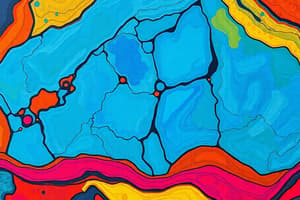Podcast
Questions and Answers
How are igneous rocks formed?
How are igneous rocks formed?
Igneous rocks are formed by the cooling and solidification of hot and liquid magma and lava.
What is the relationship between sedimentation and the age of the earth?
What is the relationship between sedimentation and the age of the earth?
The age of the earth can be roughly estimated by calculating the total thickness of sedimentary rocks and the annual rate of their deposition.
What was the thickness of sediments found above the statue of Ramses II, and what does it signify?
What was the thickness of sediments found above the statue of Ramses II, and what does it signify?
The statue was found buried under 9 feet of sediments, indicating the historical sedimentation rate in that region.
Calculate the annual rate of sedimentation based on the Ramses II statue example.
Calculate the annual rate of sedimentation based on the Ramses II statue example.
What estimate is made about the thickness of sedimentary rocks on the earth's surface?
What estimate is made about the thickness of sedimentary rocks on the earth's surface?
According to the content, how old are the first sedimentary rocks estimated to be?
According to the content, how old are the first sedimentary rocks estimated to be?
What is the estimated age of the earth based on sedimentary rock calculations?
What is the estimated age of the earth based on sedimentary rock calculations?
Describe the sedimentary deposits calculation from the valleys of Colorado and Wyoming.
Describe the sedimentary deposits calculation from the valleys of Colorado and Wyoming.
What is the discrepancy faced by scientists when calculating the age of the earth?
What is the discrepancy faced by scientists when calculating the age of the earth?
What conclusion can be drawn from the various methods of estimating the age of the earth?
What conclusion can be drawn from the various methods of estimating the age of the earth?
Flashcards are hidden until you start studying
Study Notes
Formation of Igneous and Sedimentary Rocks
- First igneous rocks formed from cooling and solidification of magma and lava post Earth's origin.
- Igneous rocks underwent disintegration, leading to sediments transported by geological agents like rivers and wind.
- Formation of the first sedimentary rocks occurred as these sediments were deposited in water bodies.
- Continuous sedimentation throughout geological periods resulted in thickening of sedimentary rocks.
Calculation of the Age of Earth
- Age of the first sedimentary rocks can be estimated using the formula:
- Age = Total Thickness of Sedimentary Rocks / Annual Rate of Deposition.
- Variations in sedimentary rock thickness at different locations led to inconsistent age estimates by scientists.
Ramses II Statue Case Study
- In 1854, a statue of Ramses II was discovered buried under 9 feet of sediment.
- The statue was installed approximately 3000 years prior to its discovery.
- Based on this, the rate of sedimentation can be estimated:
- 9 feet deposited in 3000 years implies a rate of 3 feet in 1000 years.
- Total depth of sedimentary rocks is roughly 100 miles (528,000 feet).
- Calculation led to: 528,000 feet = 176 million years for the age of the first sedimentary rocks.
- Assuming the Earth is three times older than the first sedimentary rocks gives an age of about 500 million years, which is lower than expectations.
Colorado and Wyoming Case Study
- Sedimentary deposits in the valleys of Colorado and Wyoming estimated to be 1/2 mile thick, deposited in about 6.5 million years.
- Calculation reveals that a thickness of 100 miles would take approximately 1300 million years.
- Following the same assumption of Earth’s age being three times that of the first sedimentary rocks could yield varying results.
Studying That Suits You
Use AI to generate personalized quizzes and flashcards to suit your learning preferences.




